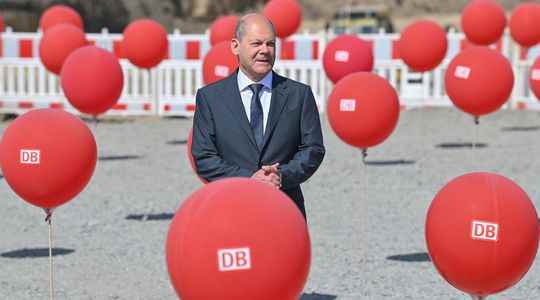Does Olaf Scholz have the shoulders strong enough to lead Germany? His lack of determination with regard to the war in Ukraine in any case worries Europeans, particularly in the East, who wonder if he has really chosen his side.
The Ukrainian ambassador in Berlin, Andrij Melnyk, accuses him of playing the fifth column of the Kremlin and of lacking depth. While Ukraine fights to defend its existence, the Chancellor “pouts” for unimportant diplomatic quarrels, deplores this diplomat. “This is not what is expected of a statesman,” he adds. In reality, the Chancellor had refused to go to kyiv because the President of the Federal Republic, Frank-Walter Steinmeier, had been declared persona non grata there because of his pro-Russian policy in recent decades.
The weakest Chancellor in the history of the Federal Republic
Constantly on the defensive, Olaf Scholz does not manage to get out of the spiral of criticism against a governance full of contradictions. At each interview, he is obliged to justify himself on his procrastination, in particular the delivery of arms to Ukraine, which he has long refused, or on the energy embargoes, which he rejects.
“He is an extremely cautious man, sums up Markus Linden, political scientist at the University of Trier and member of the Social Democratic Party (SPD). He always has the same strategy: to assess the risks before making decisions.” To justify its hesitations on the deliveries of offensive materials, Scholz warned the Germans on a possible “nuclear war”. A few days after his alarmist declarations, he backtracked…
A reversal which is explained by its very limited political room for maneuver. “The German Chancellor has much less power than the French President”, recalls Markus Linden. He must reckon with Parliament. However, the SPD obtained only 25% of the votes in the legislative elections, which makes it the weakest Chancellor in the history of the Federal Republic. “You can’t ask him to be in the heavyweight category when he’s only a featherweight,” analyzes Gerd Mielke, a political scientist at the University of Mainz. Added to this is the fact that this chancellor is leading Germany for the first time in a “menage à trois”. The Greens and Liberals, who between them won as many votes as the SPD, put maximum pressure on him to deliver offensive weapons to kyiv.
The ambiguities of the Social Democrats with Russia
On the other hand, Scholz must also take into account the deep malaise of the SPD, still stunned by the Russian invasion. “The failure of the German left in its economic rapprochement with Moscow was a tsunami for the SPD, recalls Gerd Mielke. A significant fraction, which is not pro-Russian in itself, remains attached to the policy of détente in the East formerly defended by Willy Brandt.”
In this context, a change of majority in the Federal Assembly (Bundestag) is already in the air when Scholz has been in office for less than six months. In theory, environmentalists and liberals are able to run Germany with a conservative chancellor. It is no coincidence that the leader of the opposition, Friedrich Merz, traveled to kyiv to meet Volodymyr Zelensky there – before Olaf Scholz. An overhyped trip, which was not unrelated to the regional election of May 15 in North Rhine-Westphalia, the most populous region of Germany.
This risk, Scholz has identified it. He keeps in mind the trauma of the SPD in 1982, when his mentor, the Social Democratic Chancellor Helmut Schmidt, was overthrown in the assembly because of the reversal of the small liberal party in the “euromissile crisis”. Helmut Kohl had become Chancellor without even going to the polls. “The threat of another majority in parliament is real,” said Thorsten Faas, a political scientist at the Free University of Berlin. “Merz is patiently waiting for his turn to take power. His idea is to repeat the coup of 1982, by filing a constructive motion of no confidence against Scholz”, adds Markus Linden.
Close to a government crisis
The new leader of the conservative right has decided to concentrate all his attacks on Scholz’s hesitations. By threatening to table in the Bundestag, at the end of April, a motion in favor of the delivery of heavy weapons, to which the Chancellor was still opposed at the time, he succeeded in a first operation of destabilization: Olaf Scholz had to give in to prevent the deputies of the majority do not change sides and trigger a government crisis.
The Chancellor, who has never been a good communicator, must above all urgently correct his strategy in this area. When he was secretary general of the SPD, he was nicknamed the automaton (“Scholzomat”) for his ready-made answers. However, on the German political scene, two talented orators overshadow him: Friedrich Merz and above all Robert Habeck, the very popular Ecologist Minister for the Economy and the Climate, who is already called the “Chancellor of the shadow”.
Because the hardest part remains to be done: the implementation of the “change of era” (Zeitwende) that Scholz promised the Germans in the Bundestag on February 27. And in particular a complete renovation of an army in tatters for which he has provided a special fund of 100 billion euros. However, we still do not know how he will finance it. Especially since its finance minister, the liberal Christian Lindner, wants to reconnect with budgetary rigor in 2023. In addition, the implementation of the energy transition, the government’s flagship project, has not yet begun. “For now, the war tends to unite the coalition parties,” said Gerd Mielke. The real difficulties should start with the first decisions on climate policy…
